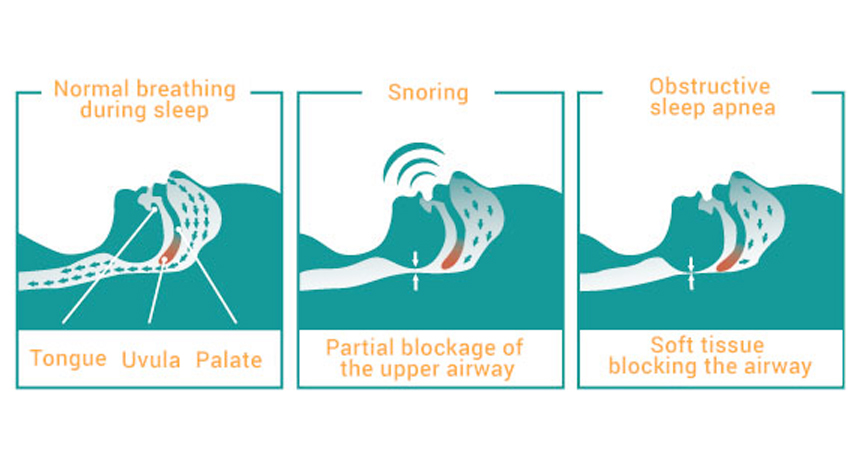Plain old snoring can get a little annoying, for someone listening to it. But more than for the listener it can impose serious life threats when a snorer repeatedly stops breathing for brief moments, it can lead to systemic diseases and cardiovascular problems
It’s a condition known as sleep apnea , in which the person may experience pauses in breathing more than 30 times per hour or more during sleep. These episodes wake the sleeper as he or she gasps for air. It prevents restful sleep and is associated with high blood pressure, arrhythmia, stroke, and heart failure.
Obstructive sleep apnea is caused by blockage of the upper respiratory airways in which either the throat muscles collapse, the tongue falls back into the airway, or enlarged tonsils and/or adenoids impede air flow. When your airway is choked, the brain has to wake itself to signal the respiratory system to kick back into gear. This often leads to regained jerky breathings with loud gasps, snorts, or body jerks that may wake you from your slumber and disrupt your sleep. When you’re waked multiple times through the night, your body and mind don’t get the rest they need to function, leaving you tired and drained during the daytime.
Obstructive sleep apnea can be considered one of three levels depending on the amount of nightly sleep interruptions in breathing:
- Mild OSA – The sufferer experiences 5-14 episodes of interruptions in breathing in an hour.
- Moderate OSA – The sufferer experiences 15-30 episodes of interruptions in breathing in an hour.
- Severe OSA – The sufferer experiences 30 or more interruptions in breathing in an hour.
“The evidence is very strong for the relationship between sleep apnea and hypertension and cardiovascular disease generally, so it becomes a necessity to identify these individuals and understand the association between the diseases.
A Common Problem
One in five adults suffers from at least mild sleep apnea , and it afflicts more men than women, The most common type is obstructive sleep apnea in which weight on the upper chest and neck contributes to blocking the flow of air. (Another type, called central sleep apnea , is far less prevalent.)
There is a growing awareness concerning the link between sleep apnea and the consequences of excessive daytime sleepiness. Many people are beginning to realize the terrible impact, that sleep apnea can have on their everyday lives and well being. However, the greatest threat to one’s health from untreated sleep apnea isn’t just the damaging effects of sleep deprivation, but the risk of developing heart disease.
Studies have shown a strong link between sleep apnea and a slew of cardiovascular problems that include high blood pressure, heart arrhythmia, heart attack, and cardiovascular disease.
A disruptive sleep can lead to the dreaded cardiac conditions as during an apnea event (pause in breathing) the oxygen levels in your blood drop significantly. When this happens your brain partially wakes from sleep to send signals to the nervous system to constrict the blood vessels (tighten up) in order to increase the flow of oxygen to your heart and brain.
When your blood pressure increases at night to keep oxygen flowing to your heart and brain, it causes high blood pressure during sleep. Most people’s blood pressure drops ten to twenty percent during sleep, but many patients with sleep apnea show an increase in blood pressure of ten to twenty percent.
Unfortunately, the increased blood pressure experienced during sleep often begins to overlap into periods of wakefulness. Even though your blood pressure only needs to be increased at night when you require extra respiratory effort to get oxygen, many people with sleep apnea end up with increased blood pressure at all times.
High blood pressure is a major risk factor for heart disease, stroke, heart attack, and many other medical problems, and sleep apnea is a major risk for high blood pressure.
A study by the National Sleep Foundation found that men with severe OSA were 58% more likely to develop new congestive heart failure than men without sleep apnea . They also found that men aged 40-70 with an apnea-hypopnea index (AHI) of 30 or higher were 68% more likely to develop coronary heart disease than those with lower AHIs
Studies also show that when patients with sleep apnea are treated for their disorder, their blood pressure and risk of heart disease drops significantly.
Obstructive sleep apnea (OSA) is associated with obesity , which is also a major risk factor for heart disease and stroke. Besides obesity contributing to sleep apnea , sleep deprivation caused by sleep apnea can, in an ongoing unhealthy cycle, lead to further obesity .
Another type of sleep apnea , called central sleep apnea (CSA), is far less prevalent.) In CSA the brain doesn’t send regular signals to the diaphragm to contract and expand. There is limited snoring with CSA, and it has been associated with brain stem stroke because the brain stem is where the impulse to breathe comes from.
Listen to Those Snoring Complaints
As “It’s really hard to detect if you live alone, unless you go through a sleep study,”
People with sleep apnea may be more tired during the day, and therefore prone to accidents or falling asleep.
Identify before it lead to grave results. A simple test can get back you peaceful, uninterrupted sleep and a long healthy life
 +919979891672
+919979891672 











No Comments